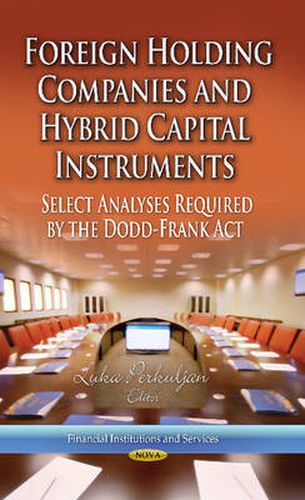Readings Newsletter
Become a Readings Member to make your shopping experience even easier.
Sign in or sign up for free!
You’re not far away from qualifying for FREE standard shipping within Australia
You’ve qualified for FREE standard shipping within Australia
The cart is loading…






During the 2007-2009 financial crisis, many U.S. and international financial institutions lacked capital of sufficient quality and quantity to absorb substantial losses. In 2010, the Dodd-Frank Wall Street Reform and Consumer Protection Act introduced new minimum capital requirements for banks and savings and loan holding companies, including intermediate holding companies of foreign banks. Hybrid capital instruments are securities that have characteristics of both equity and debt. The Federal Reserve allowed bank holding companies to include limited amounts of hybrid instruments known as trust preferred securities in the highest level of required capital, although other federal banking regulators never approved these or other hybrid instruments for this purpose. Responding to concerns that these instruments did not perform well during the 2007-2009 financial crisis, in 2010 the Dodd-Frank Act required regulators to establish rules that will exclude the instruments from Tier 1 capital. This book examines the potential effects of changes in U.S. capital requirements on foreign-owned intermediate holding companies and the use, benefits, and risks of hybrid instruments as Tier 1 capital.
$9.00 standard shipping within Australia
FREE standard shipping within Australia for orders over $100.00
Express & International shipping calculated at checkout
During the 2007-2009 financial crisis, many U.S. and international financial institutions lacked capital of sufficient quality and quantity to absorb substantial losses. In 2010, the Dodd-Frank Wall Street Reform and Consumer Protection Act introduced new minimum capital requirements for banks and savings and loan holding companies, including intermediate holding companies of foreign banks. Hybrid capital instruments are securities that have characteristics of both equity and debt. The Federal Reserve allowed bank holding companies to include limited amounts of hybrid instruments known as trust preferred securities in the highest level of required capital, although other federal banking regulators never approved these or other hybrid instruments for this purpose. Responding to concerns that these instruments did not perform well during the 2007-2009 financial crisis, in 2010 the Dodd-Frank Act required regulators to establish rules that will exclude the instruments from Tier 1 capital. This book examines the potential effects of changes in U.S. capital requirements on foreign-owned intermediate holding companies and the use, benefits, and risks of hybrid instruments as Tier 1 capital.